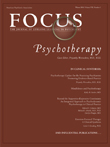Adult Attachment Patterns and Individual Psychotherapy: A Review
Abstract
Attachment theory provides an empirically grounded framework for understanding important aspects of interpersonal functioning in children as well as adults. Recently attachment theory has found increasing use within the field of individual psychotherapy with adults. This article outlines the theory and measurement of individual differences in adult attachment, and the relevance of such adult attachment patterns to psychotherapy. It then offers a review and discussion of empirical findings regarding the effects of client and therapist attachment patterns on process and outcome in individual psychotherapy with adults. Empirical studies have linked adult attachment patterns to differences in client and therapist in-treatment behaviour, to differences in the quality and development of the therapeutic alliance, and to differences in therapeutic outcome. Although empirical studies on the subject are still few in number, evidence is emerging for the importance of adult attachment patterns in the therapeutic relationship.
(Reprinted with permission from Clinical Psychology Review 26 (2006) 968–984)



